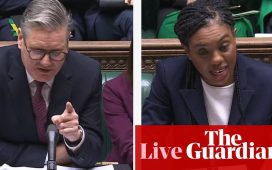A coroner who ruled that SAS soldiers were not justified in killing four IRA members in a 1992 ambush in Northern Ireland is to refer his findings to the director of public prosecutions.
Justice Michael Humphreys’ decision is likely to reignite last week’s row in the House of Commons, when unionists and Conservative MPs said his ruling earlier this month concluding that the deaths were unwarranted was “rewriting the past”.
On Thursday, the judge said he was obliged by law to send a report to Northern Ireland’s DPP if an inquest disclosed evidence that indicated a criminal offence may have been committed.
He said he has no discretion in the matter and is required to send the referral under the Justice (Northern Ireland) Act, 2002.
“As I read the statutory obligation that’s imposed upon me, I am obliged to send a written report of my findings in this inquest to the director of public prosecutions and I will do so as soon as that is practicable,” he said at Belfast’s Royal Courts of Justice.
The inquest related to the shooting of four Provisional IRA members – Kevin Barry O’Donnell, 21, Sean O’Farrell, 23, Peter Clancy, 19, and Daniel Vincent, 20 – minutes after they had carried out a gun attack on Coalisland RUC station in February 1992.
The inquest heard that the soldiers had, without warning, fired up to 570 rounds at the stolen lorry they had used as the men arrived at St Patrick’s church car park, in Clonoe.
The SAS unit had been waiting behind a hedgerow for the gang to arrive after the security forces received intelligence that they would travel to the church, the inquest heard.
Earlier this month, Humphreys, who is also a high court judge, found the SAS soldiers did not have an honest belief in the necessity of using lethal force and that such force was unjustified and not reasonable.
At the time, the soldiers claimed the use of lethal force was justified to protect their lives and others from the IRA unit.
However, Humphreys found no attempt was made by the soldiers to arrest any of the members of the IRA unit, even as they lay seriously injured and incapacitated either on the ground or in the cab of the lorry.
Last week Jim Allister, the leader of the Traditional Unionist Voice party said there had been “tangible anger” at the coroner’s verdict on 6 February while Democratic Unionist leader Gavin Robinson said he would not stand for “rewriting of the past”.
The Conservative government brought in the Legacy Act to prevent such historic prosecutions but the Labour party is now repealing this to allow all victims of the Troubles to establish the truth.
The Northern Ireland secretary, Hilary Benn, told the House of Commons that he was limited in what he could say given the ongoing legal case but said there were “clearly very significant matters, which require careful consideration”.
Outside court on Thursday, the solicitor Niall Murphy, who represents some of the bereaved relatives in the case, said the findings in the inquest were based on evidence that was “overwhelmingly conclusive” and the families hoped and trusted the public prosecution “will come to its decision as soon as possible”.












